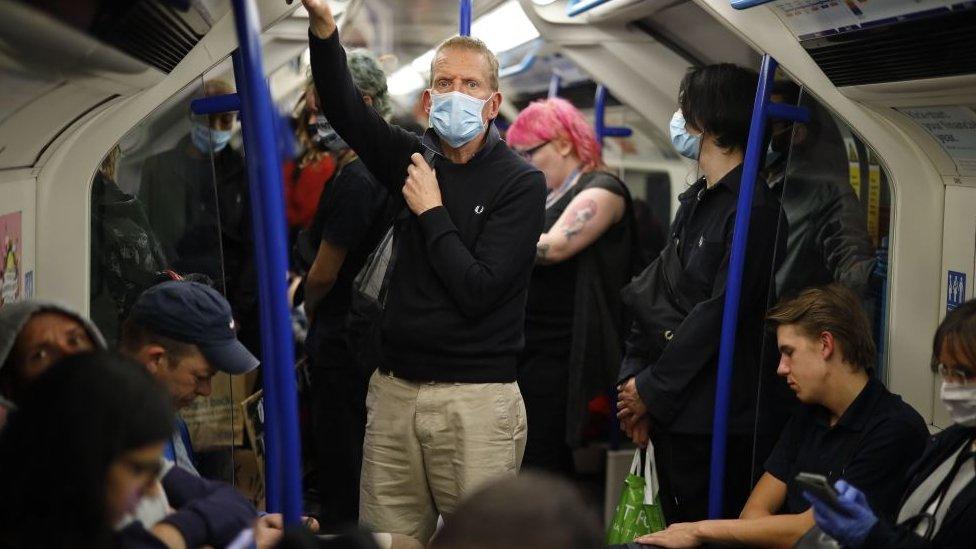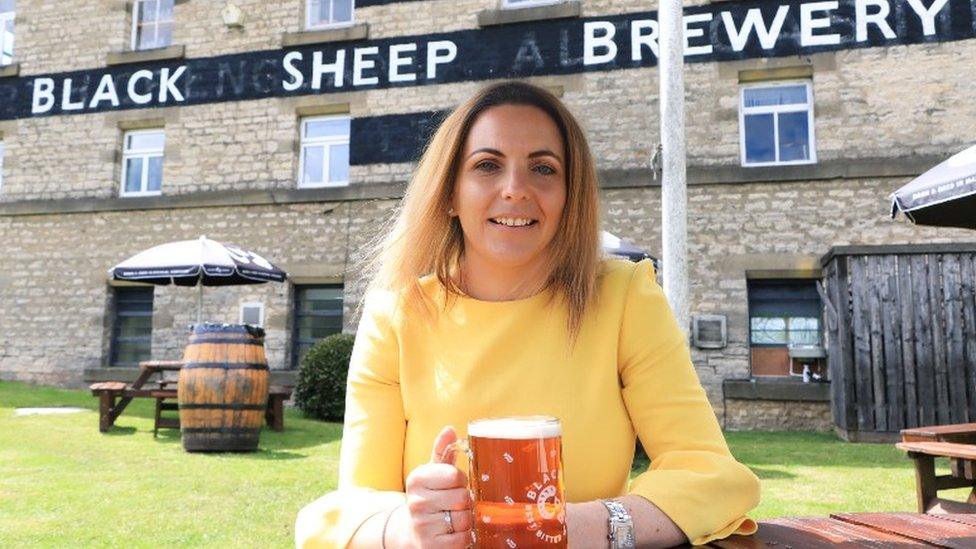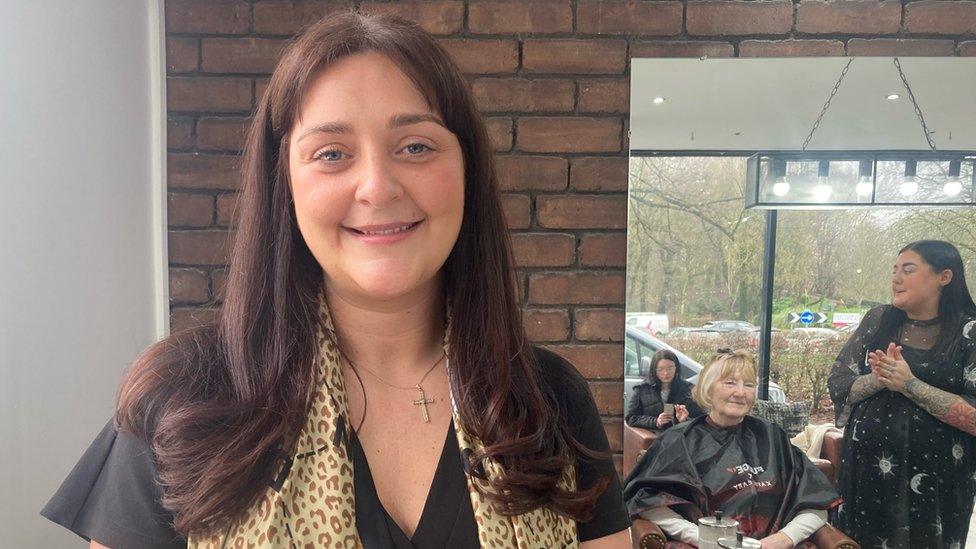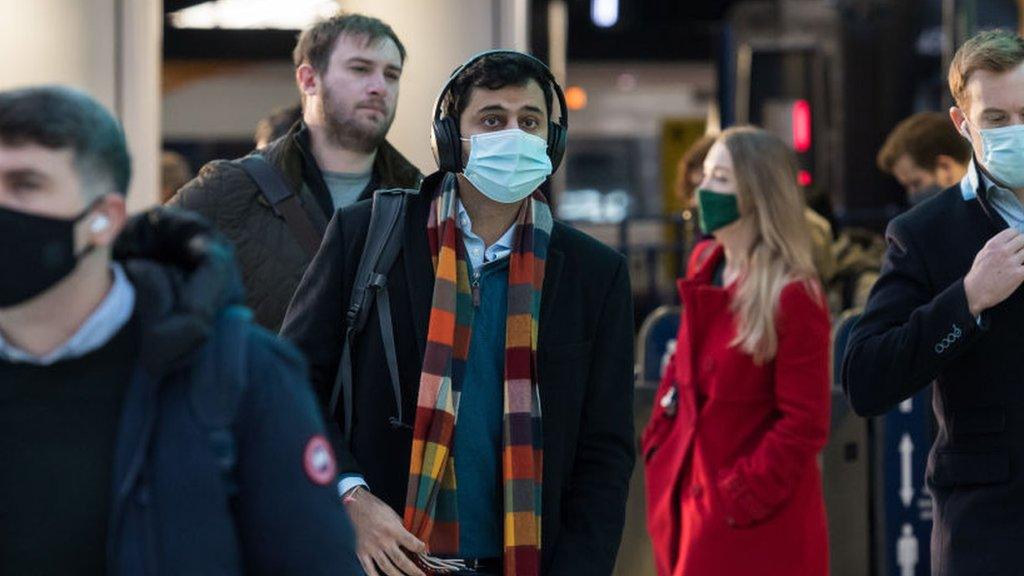Covid rules: Workers face terrible choice, says TUC
- Published
- comments

People should not be forced into making a "terrible choice" over going into work with Covid or risking losing income by self-isolating at home, the Trades Union Congress (TUC) has said.
The trade union raised concerns ahead of the just-announced scrapping of the law in England to self-isolate.
It said two million workers in low-paid jobs do not qualify for sick pay.
Boris Johnson set out plans for the end of all Covid rules in England in the House of Commons this afternoon.
From Thursday, the legal requirement to self-isolate after a positive Covid test will be removed in England, the prime minister announced. Self-isolation payments will also end from this date.
At the moment, positive or asymptomatic people have to isolate for up to 10 days, but can end their isolation earlier if they register negative lateral flow tests on both days five and six.
Leader of the Opposition Sir Keir Starmer said cutting support payments will hit the lowest-paid the hardest.
As well as scrapping isolation requirements, Boris Johnson announced the end of free Covid tests for the general public, after the prime minister said £2bn was spent on tests in January.
Business Minister Paul Scully told the BBC's Today programme earlier on Monday that the money "could be spent on other priorities" as cases and deaths continue to fall.
"We want to get people back into their workplaces, we want to get the economy working, but it will be up to employers and employees," he added.
Kate Bell of the TUC said people who did not qualify for sick pay due to their wages were facing a "major issue" over choosing whether to self-isolate with Covid or not.
"If they have got Covid they want to be able to stay at home without facing a terrible choice about whether that means losing income for a week and they want to keep their colleagues safe and the other people they work with safe too," she said.
"That shouldn't be a choice that people are forced to make on their own."
Meanwhile, TUC general secretary Frances O'Grady told the BBC's World at One that workers could not be expected to "fork out themselves for tests".
"Just hoping that employers will do the right thing I think is frankly for the birds", she added.
"Millions of workers need the government to take responsibility and not just gamble on their health, or frankly, our public health."
The prime minister has said the end to restrictions will return people's freedoms, but some experts have urged caution.
Rachel Knappier, director of service at HR company Croner, told the Today programme that it looked like the decision over isolation would be "put back in the hands" of employers.
She urged workers who were concerned to speak to their employers and said it was "really important" businesses have clear policies.
The legal requirement to self-isolate for a fixed period after testing positive in England has been in place ever since mass testing was rolled out. Before that, most Covid testing was limited to people as they arrived in hospital with symptoms.

'This is something we need to live with'

Charlene Lyons, chief executive of the Black Sheep Brewery, told the BBC the company would pay for Covid tests for staff "if we need to".
But she said she did not think the brewer would be "happy paying them sick pay" if someone had a dry cough.
"Luckily the majority of people, they can work from home if they need to," she added. "For us, we're trying to adopt a principle whereby this is something we need to live with, it's like flu.
"If you feel unwell you stay off work, if you feel well you come in."
Ms Lyons said there had been "various conversations" with people who felt vulnerable, and added people could be isolated in the company's offices from others.

Meanwhile, Chelsea Garside, who runs Ziba Hair and Beauty Salon in Monton in Greater Manchester, said she hoped people would "use their common sense" on isolating.
"If you're poorly, you wouldn't come to an appointment. If you had the flu, you wouldn't go to work and risk spreading it," she said.
Ms Garside said she thought she would provide tests for her team to make it easier for them to come into work and "create a happy space in the salon".

- Published21 February 2022

- Published21 February 2022